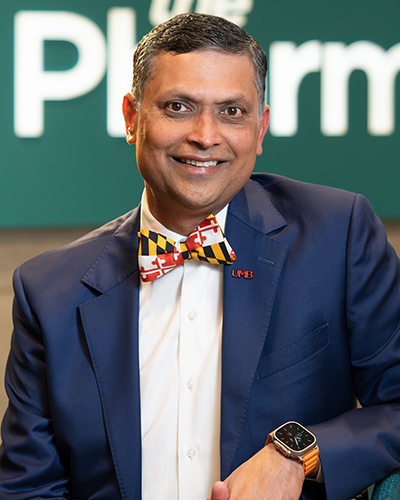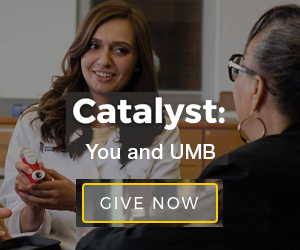 Joga Gobburu, PhD, MBA, MSc
Joga Gobburu, PhD, MBA, MSc
School of Pharmacy
Professor, Department of Practice, Sciences, and Health Outcomes Research
Director, Center for Translational Medicine
Joga Gobburu, PhD, MBA, MSc, is a trailblazer in the field of translational medicine, which integrates knowledge across experiments and clinical trials to lay the groundwork for strategic decisions on drug regulation and/or drug development and precision medicine.
In recent years, the University of Maryland School of Pharmacy (UMSOP) professor has compounded his impact with entrepreneurial pursuits, co-founding two companies, PumasAI, Inc., and VivPro Corporation, that support pharmaceutical scientists, health care providers, biotechnology and pharmaceutical companies, and regulatory agencies.
Recognizing his innovations and success, Gobburu has been named the University of Maryland, Baltimore’s (UMB) 2024 Founders Week David J. Ramsay Entrepreneur of the Year.
“Typically, academic research emphasizes technical and theoretical understanding, which can be quite distant from the immediate practical needs of a business,” said Gobburu, who also is director of the Center for Translational Medicine (CTM) at UMSOP. “Bridging this gap — transforming complex research into scalable, market-ready products or solutions — requires a combination of scientific expertise and business acumen.
“My prior experience in drug development played a crucial role in keeping our innovations grounded in practical application,” he added. “Additionally, my MBA degree provided valuable insights into the business side of things, helping me navigate this transition effectively.”
PumasAI provides its clients with a data analytics suite, clinical decision support system, and strategic and scientific consulting. VivPro offers a bio-intelligence software platform and innovative services to help clients make evidence-based clinical, regulatory, and business decisions.
“For academic inventions to reach widespread utility, they need to be developed further to be commercially viable,” Gobburu said. “That was the motivation for starting these companies. Commercial success also leads to the ability to give back to society. For example, Pumas software is free for academic research and training.”
Vijay Ivaturi, PhD, a former assistant professor at UMSOP, co-founded PumasAI with Gobburu and is the company’s CEO. Ivaturi calls his colleague “an eminent figure in the field of pharmacometrics and translational medicine whose contributions have significantly advanced clinical practice, public policy, and academic scholarship.”
“His ventures highlight his entrepreneurial spirit and commitment to leveraging technology to improve health care outcomes,” Ivaturi added of Gobburu. “His contributions to UMB’s strategic research plans have been profound, and his work aligns perfectly with the Universitywide mission to advance health and wellness through innovative education and research. His efforts have not only enhanced the University’s reputation but also contributed to the broader scientific community.”
Drug Development Insight
Before arriving at UMB in 2011, Gobburu was a senior biomedical research scientist and founding director of pharmacometrics at the Food and Drug Administration, giving him unique insight into the technical, regulatory, and decision-making aspects of all phases of drug development. At UMSOP, he created a top-notch research and education program in pharmacometrics and introduced the first 100 percent online MS in Pharmacometrics program, which has graduated more than 200 students who are now contributing to the pharmaceutical industry and regulatory agencies globally.
Gobburu also founded CTM, which uses quantitative medicine to analyze data from experiments and clinical trials to help reduce the time it takes to bring a drug to market. It is now home to dozens of scientists, composed of junior faculty, postdoctoral fellows, and graduate students.
On another front, Gobburu is co-investigator of a research program that aims to develop an artificial blood product for the U.S. military and received a $46.4 million grant in 2023 from the federal Defense Advanced Research Projects Agency (DARPA). The collaboration includes CTM; Allan Doctor, MD, of the University of Maryland School of Medicine, who is the study’s principal investigator and a former UMB Entrepreneur of the Year; and more than a dozen universities and biotech companies.
“The DARPA grant is another exciting entrepreneurial endeavor,” Gobburu said. “I love building ventures that seamlessly combine efficiency and innovation, all while tackling real-world challenges. What excites me most is marrying science with strategy to create lasting impact. The most rewarding part of this journey is helping scientists unlock their full potential and achieve extraordinary results.”
‘Profound Impact on Health Care’
Gobburu has been published prolifically in peer-reviewed journals, and his more than 170 publications and book chapters have been cited in more than 5,000 other publications. His accolades include the 2019 Sheiner-Beal Award from the American Society for Clinical Pharmacology and Therapeutics recognizing achievements in pharmacometrics research or leadership, and the 2023 Sheiner Lecturer Award from the International Society of Pharmacometrics, honoring his long-standing contributions to the field.
UMSOP Dean Sarah L.J. Michel, PhD, said the school and wider UMB community receive great benefits from Gobburu’s research, teaching, and expertise.
“Dr. Gobburu’s research has directly impacted clinical practice by improving drug efficacy and safety evaluations, thereby enhancing patient care,” Michel said. “His quantitative disease models have become essential tools for health care professionals, enabling more precise and informed decision-making.
“His work has not only influenced academic scholarship, but it also has transformed clinical practice and public policy, demonstrating a profound impact on health care outcomes,” she added. “With the Center for Translational Medicine, creating and sustaining such an organization in an academic setting reflects Dr. Gobburu’s scientific leadership. We are so fortunate to have Dr. Gobburu at the School of Pharmacy.”
Gobburu said he was honored to receive the UMB award, thanking all who have supported his efforts over the years, including members of the drug development community, current and former colleagues and trainees, mentors, and business partners.
“My career in building sustainable ventures has only been possible because I was fortunate enough to encounter the right opportunities,” he said. “The true magic, however, came from the brilliant people around me who transformed those opportunities into remarkable successes. We also are fortunate to have received unwavering support from the UMB Office of Technology Transfer and the School of Pharmacy. Their dedication to helping faculty succeed has been instrumental in our journey.”
— Lou Cortina



